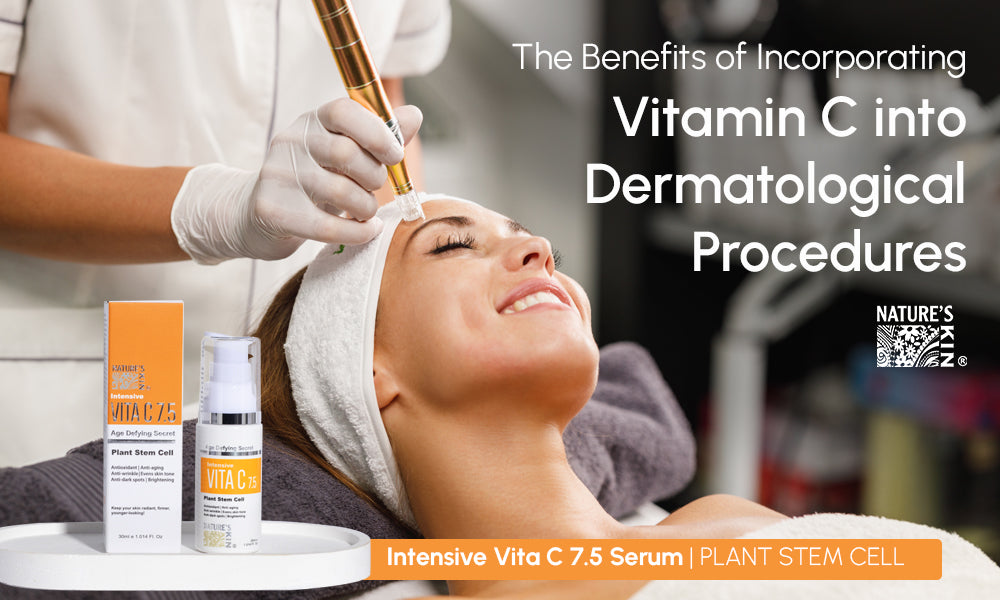The Benefits of Incorporating Vitamin C into Dermatological Procedures

We are pleased to introduce our Intensive Vitamin C 7.5 Serum, a plant-based stem cell vitamin C serum that is rich in antioxidants and natural plant extracts. We know that you are either an avid user of our product or are interested in learning more about it. We are happy to share with you how you can maximize the potential of our serum based on the feedback and recommendations of our dermatologists and clinics who are already using our product.
Vitamin C is a powerful antioxidant that has many benefits for the skin. It can help to protect against sun damage, reduce the appearance of wrinkles and fine lines, and improve skin tone and texture. Vitamin C can also be used to improve the results of dermatological procedures such as micro-needling, Microdermabrasion, and chemical peels.
Plant Stem Cell-Based Vitamin C
In recent years, there has been a growing interest in plant stem cell-based vitamin C. Plant stem cells are not live cells and cannot regenerate human stem cells. However, they provide a high concentration of antioxidants and anti-inflammatory properties, which helps defend against sun damage and aging. Nature's Kin vitamin C serum uses a proprietary technology called "Stem cell activator" to activate plant stem cells. This activation process allows the plant stem cells to reproduce and regenerate, making the serum more potent and providing maximum benefits.
Natural Ingredients
In addition to being plant stem cell-based, vitamin C can also be made from natural ingredients. This means that it is less likely to cause irritation or allergic reactions. The natural source of our vitamin C serum is grapefruit extract in addition to botanical extracts such as star anise, grape etc.
How Plant Stem Cell-Based Vitamin C Can Improve the Results of Dermatological Procedures
Plant stem cell-based vitamin C can help to improve the results of dermatological procedures in a few ways. First, it can help to protect the skin from the damage caused by these procedures. Second, it can help to boost collagen production and reduce the appearance of wrinkles and fine lines. Third, it can help to reduce inflammation and promote healing.
How Vitamin C Can Improve the Results of Dermatological Procedures
Dermatological procedures such as micro-needling, microdermabrasion, and chemical peels can all help to improve the appearance of the skin. However, these procedures can also damage the skin's surface. Vitamin C can help to protect the skin from these procedures and improve the results.
Micro-needling is a procedure that uses tiny needles to create tiny holes in the skin. This allows the skin to absorb products more easily. Vitamin C can be applied to the skin after micro-needling to help to boost collagen production and reduce the appearance of wrinkles and fine lines.
Microdermabrasion is a procedure that uses a fine sandblaster to remove the top layer of skin. This can help to improve skin texture and tone. Vitamin C can be applied to the skin after microdermabrasion to help to reduce inflammation and promote healing.
Chemical peels are a procedure that uses acids to remove the top layer of skin. This can help to improve skin tone and texture and reduce the appearance of age spots and hyperpigmentation. Vitamin C can be applied to the skin after chemical peels to help to reduce inflammation and promote healing.
Conclusion
Plant stem cell-based vitamin C is a powerful antioxidant that can help to improve the results of dermatological procedures. It is less likely to cause irritation or allergic reactions than other forms of vitamin C, and it can be incorporated into dermatological procedures in a few different ways.
If you are looking for a way to improve the appearance of your skin, incorporating plant stem cell-based vitamin C into your skincare routine or dermatological procedures may be a good option for you. Talk to your doctor or dermatologist to learn more about how plant stem cell-based Intensive Vitamin C Serum can benefit your skin.




